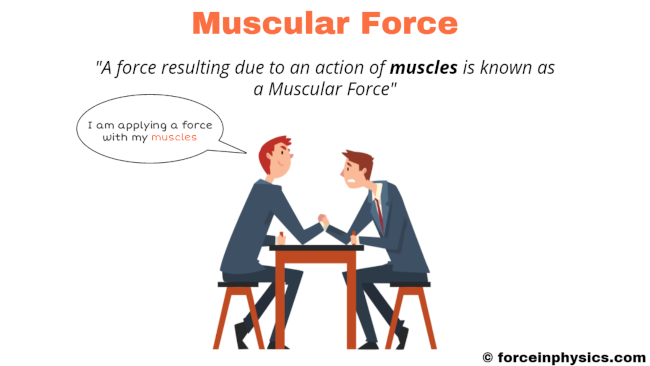
Muscular force, often referred to as muscular strength, is the physical power exerted by muscles to perform various actions, such as lifting, pushing, or pulling objects. It results from the contraction of muscles and is vital for human mobility and functionality. In practical terms, it is the strength generated by skeletal muscles through voluntary effort. For instance, in arm wrestling, both participants apply their muscular force to overcome each other’s resistance, determining the winner. This force enables individuals to engage in activities ranging from daily tasks like lifting objects to athletic pursuits like weightlifting or sprinting. It highlights the essential role of muscular force in human physical performance.
Examples
Lifting
Wooden crate
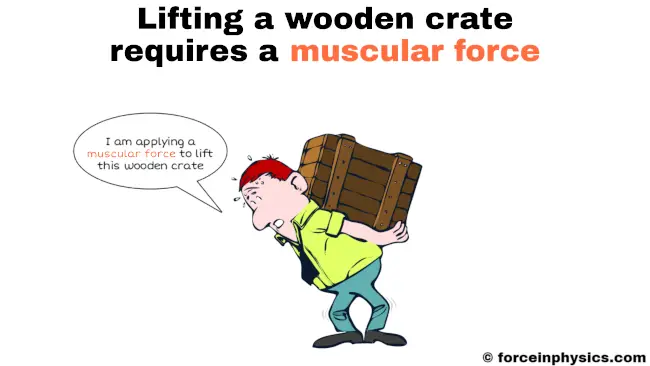
Lifting a heavy wooden crate demonstrates the use of muscular force. When a person lifts the crate, their muscles, particularly in the arms, shoulders, and back, contract to generate the strength needed to overcome gravity and raise the object. This process highlights how the body applies muscular force to perform physical tasks, specifically in lifting. The action of lifting the crate is a clear example of how muscles work together to achieve movement and support weight against external forces.
Bucket
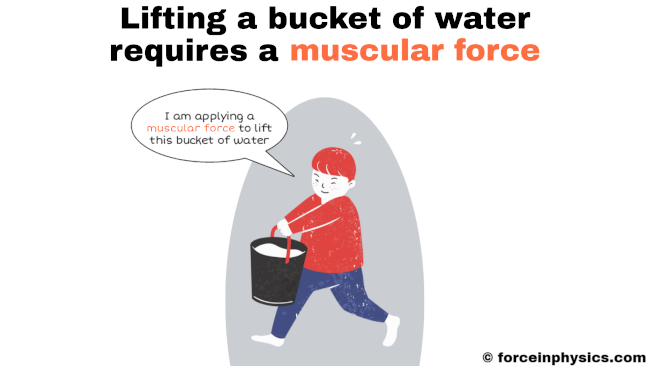
When lifting a water bucket, an individual applies force using their hands, primarily through the exertion of their muscles. In this context, muscular force comes into play as the contraction of muscles in the arms and upper body enables the person to elevate the bucket against the force of gravity. This muscular force allows for the effective lifting and transport of objects, demonstrating its practical significance in various daily activities that involve moving or carrying items.
Chewing
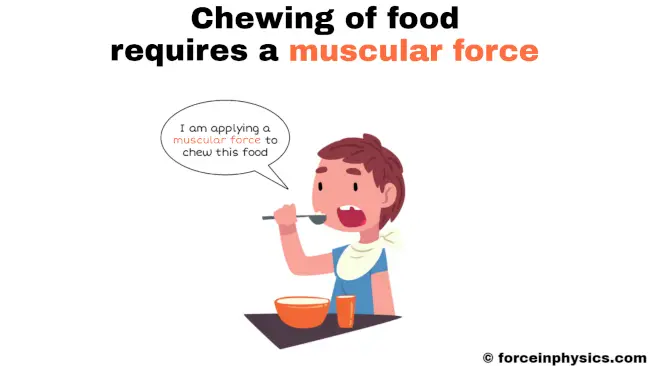
Chewing food exemplifies the application of muscular force, specifically by the jaw muscles. The contraction of the jaw muscles during this process results in the application of the necessary force to break down food into smaller, digestible particles. This muscular force is crucial for effective food processing. It allows for the digestion process to occur and enables the absorption of nutrients within the digestive system.
Walking
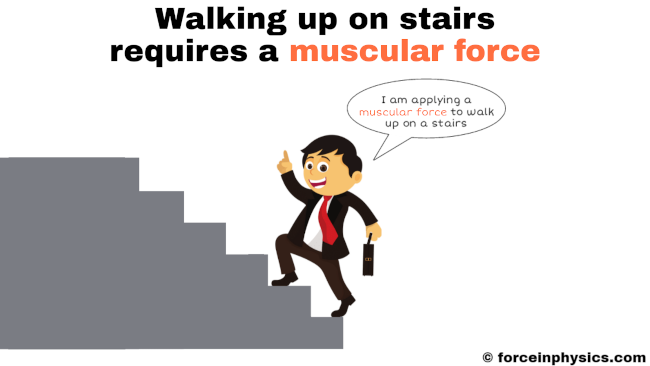
Walking on a staircase involves the application of muscular force primarily through the legs. As an individual climbs stairs, their muscles, particularly those in the legs and thighs, contract and generate the necessary force to lift the body and move it upward. This muscular force allows the person to ascend the staircase by propelling themselves upward. In doing so, they defy gravity‘s pull. The action of walking on stairs exemplifies how muscular force constantly powers mobility and physical activity in daily life.
Squeezing
Sponge
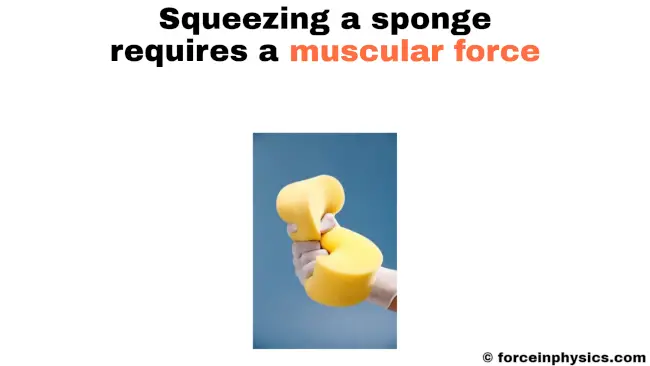
Squeezing a sponge with the hand exemplifies muscular force in action. When a sponge is compressed, the hand applies force through the contraction of hand muscles. This muscular force is the driving force behind the squeezing action, a tangible demonstration of how muscles exert force to manipulate objects like sponges.
Lemon

When a lemon is squeezed by the hand, it provides another clear demonstration of muscular force in action. As the hand muscles contract, they exert the necessary force, which results in the extraction of the lemon’s juice. This type of force, generated by muscle action, clearly illustrates the essential role of muscular force in numerous daily tasks, such as squeezing fruits to obtain their juices.
Riding
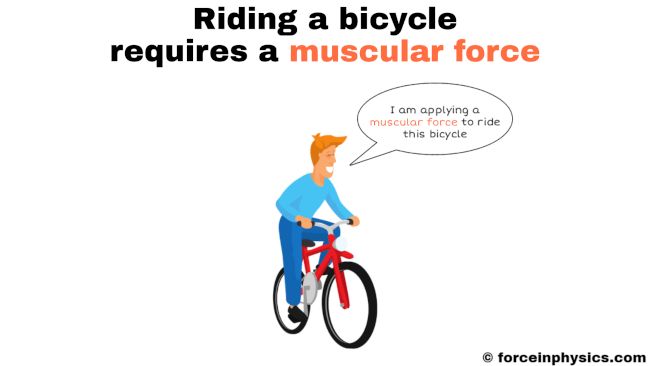
A boy sets out on a bicycle ride, it showcases the practical application of muscular force. While pedaling, he utilizes the power of his leg muscles to propel the bike forward. Through the contraction and coordinated movement of his leg muscles, this muscular force allows him to push the pedals, which in turn powers the bicycle’s motion. Riding a bicycle not only offers enjoyment but also serves as a clear example of how muscular force significantly contributes to human mobility and physical effort.
Martial arts
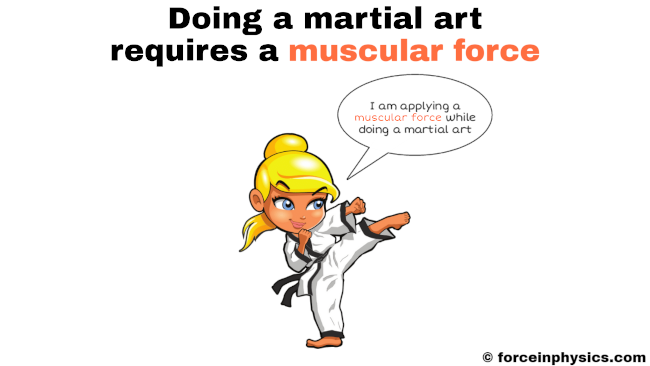
Martial arts serve as an excellent example of the application of muscular force. When practicing martial arts, individuals utilize the power of their body’s muscles in various movements and techniques. These maneuvers require controlled contraction and coordinated muscle use, enabling practitioners to execute strikes, blocks, and fluid motions with precision. Martial artists demonstrate how muscular force can be skillfully employed for combat, self-defense, discipline, and physical fitness, showcasing the versatility and strength of human muscles in action.
Kneading
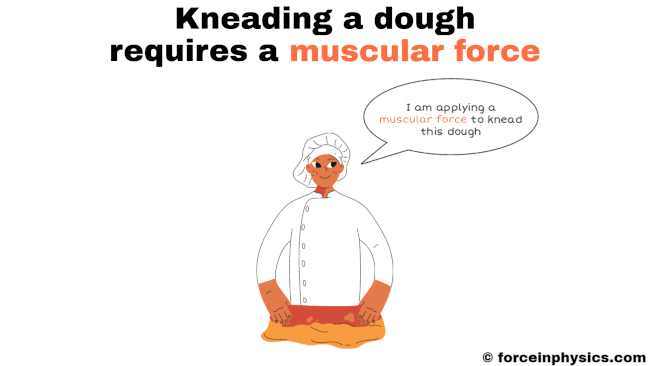
When a cook kneads chapati dough, they are actively using their hand muscles to apply force. In this process, muscular force is indispensable, as the cook relies on their muscles to manipulate and knead the dough effectively. This hands-on application of muscular force is integral to the process of preparing chapati dough.
Crushing
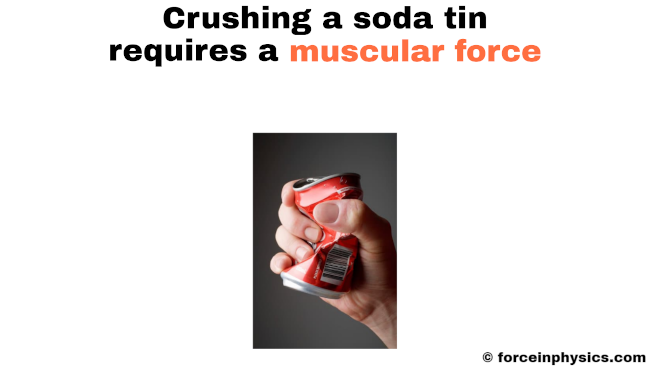
Crushing a soda tin by hand exemplifies muscular force in action. In this process, individuals utilize their hand muscles to compress and deform the tin, demonstrating how muscular force can effectively complete tasks that require strength and manual dexterity, such as flattening objects like soda tins.
Plow
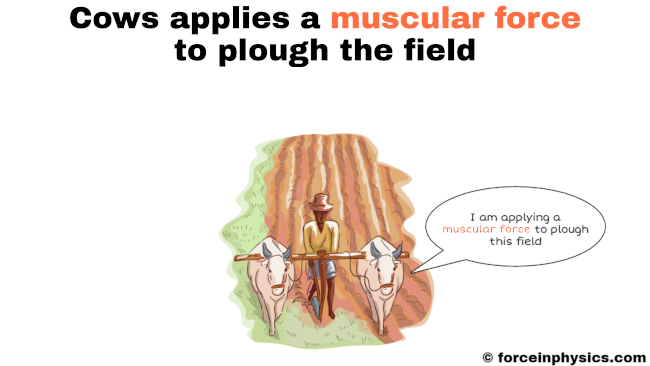
When plowing a field, whether done by animals or humans, the application of muscular force is fundamental. This force, generated through the action of muscles, provides the necessary strength to pull or push a plow through the soil, making it ready for planting. This practical application of muscular force exemplifies its vital role in agricultural activities like field preparation and cultivation.
Running
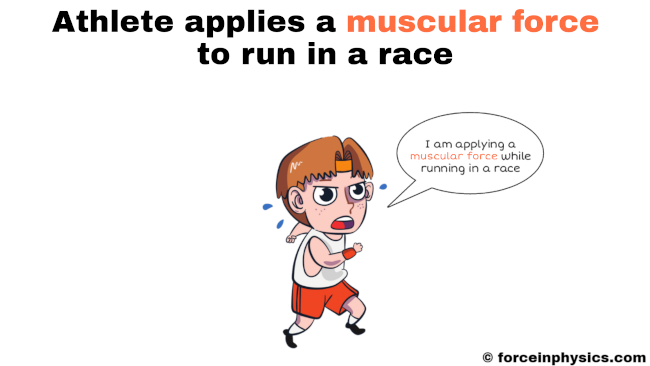
An athlete running in a race demonstrates the application of muscular force. The act of running triggers active engagement of the leg muscles, a powerful force that propels the runner forward. This force, stemming from muscle contractions while running, is commonly referred to as muscular force.
Tooth brushing
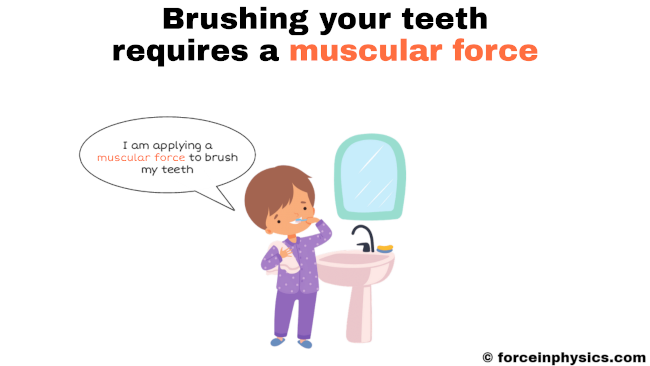
When a person brushes their teeth, they are exerting a force using their hand. This force involves the use of muscles in their hand and arm. In simple terms, it means that the person relies on their muscle strength to effectively brush their teeth. This specific type of force is commonly referred to as muscular force.
Exercise
Stretching
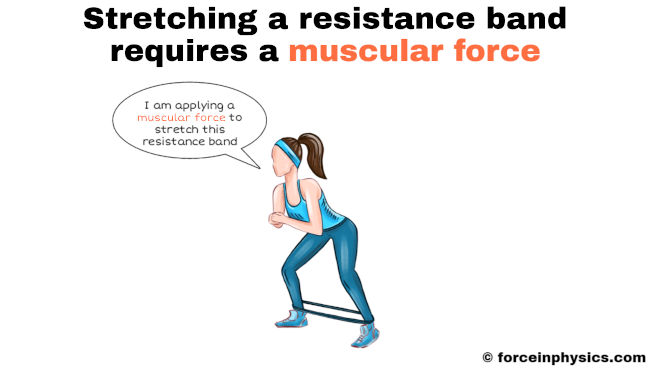
When someone stretches a resistance band with their legs, they actively engage their leg muscles to apply force. This muscular force allows them to elongate the resistance band, thereby creating resistance and providing exercise for their muscles. This scenario serves as an illustration of the concept of muscular force, demonstrating how muscle contractions generate the necessary force to stretch and work against resistance.
Push-up
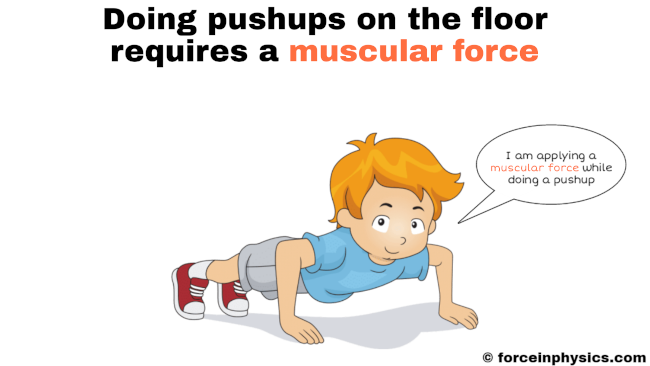
During a push-up exercise, a person employs their hand muscles to exert force while raising and lowering their body. These actions showcase the practical application of muscular force, where muscles contract and extend to manage the body’s weight during this exercise. This highlights the critical role muscular force plays in various physical activities like push-ups. Muscles are the primary movers in this process.
Bicep curl
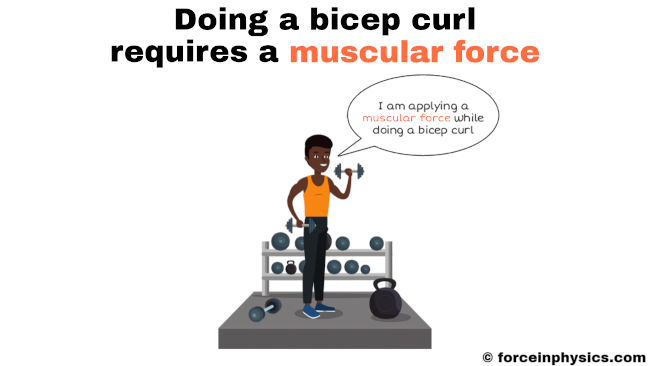
During a bicep curl, a person applies force using their hands, specifically engaging their bicep muscles. This muscular force is crucial in lifting the weight as the bicep muscles contract and exert the necessary strength to perform the curling movement. This demonstrates the essential role of muscular force in various exercises that involve lifting or moving weights.
Writing
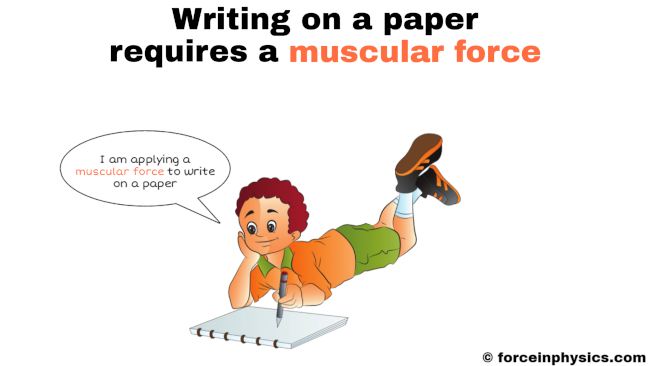
When someone writes on paper, they utilize muscular force through their hand muscles to hold the writing instrument and create marks on the paper’s surface. This common action highlights the importance of muscular force in everyday tasks that require precise hand movements, such as writing, drawing, or sketching.
Dancing
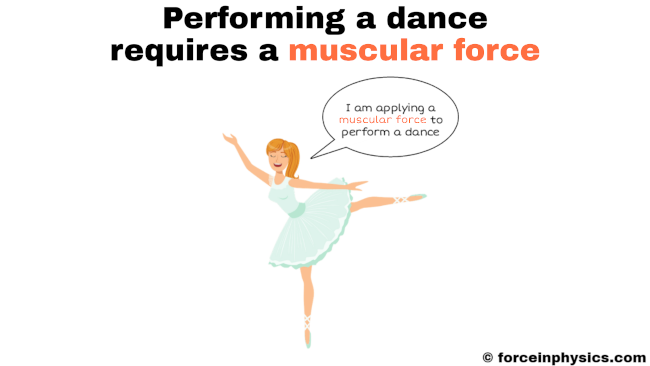
When someone engages in dance practice, they utilize various muscle groups throughout their body to perform intricate dance moves. Muscular force is required to control body movements, maintain balance, and execute dance steps gracefully. For instance, leg muscles are used for jumps and footwork, while arm muscles are engaged in lifting and twirling movements. Through coordinated and synchronized muscle movements, dancer’s demonstrate the integral role of muscular force in dance.
Typing
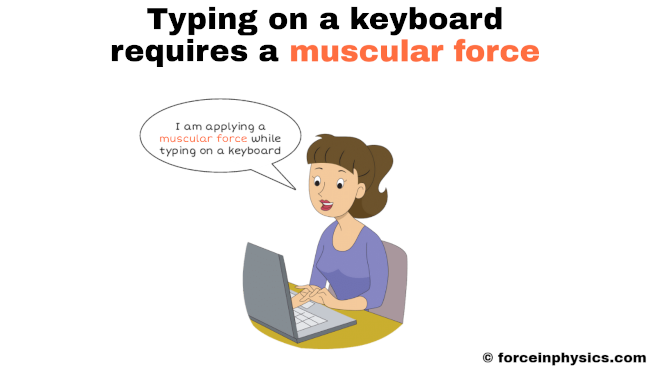
Typing involves the use of muscular force as well, primarily in the fingers and wrists. When typing on a keyboard or touchscreen device, individuals press keys or touch points with their fingers, and the force exerted by their finger muscles registers the desired characters. Continuous typing requires muscle strength and endurance, as the fingers need to move rapidly and precisely. Therefore, the act of typing is a practical example of how muscular force is applied during everyday tasks that involve fine motor skills and manual dexterity.
Horse-drawn vehicle
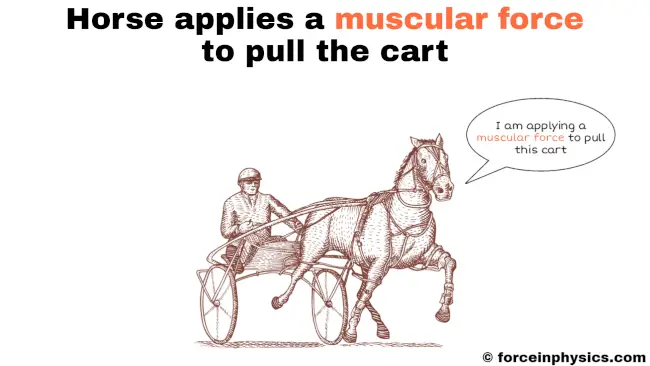
In this scenario, a horse uses its muscles, particularly its leg and back muscles, to pull a cart. The force applied by the horse’s muscles enables it to move the cart. Muscular force is the key factor here, as the horse’s physical strength is essential for the effective transportation of the cart.
Climbing
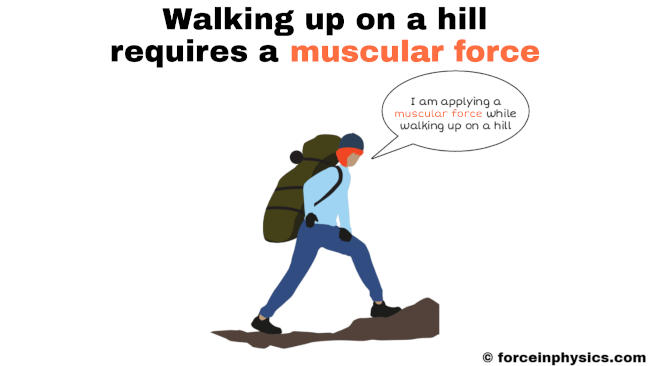
When a person walks on an incline such as a hill, they engage their leg muscles more intensively compared to walking on a flat surface. The effort required to ascend the hill involves muscular force. During uphill climbs, the active use of leg muscles to lift the body against gravity exemplifies the practical application of muscular force in everyday activities.
Hammering
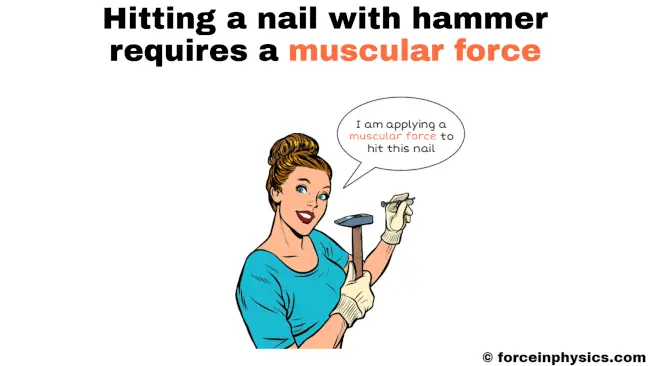
When a person uses a hammer to hit a nail, they apply force through their hand and arm muscles. The force exerted by their muscles is transmitted through the hammer to the nail, thereby enabling it to penetrate a surface. Muscular force is essential in this case, as it enables the precise and controlled application of force required for various carpentry or construction tasks.
Donkey cart
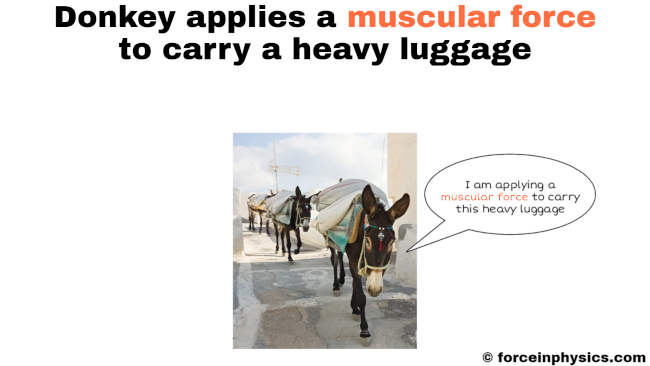
When donkeys carry heavy loads, they utilize their leg and back muscles to support and move the weight. The force applied by the donkeys’ muscles is crucial for transporting the heavy luggage. This is a clear example of muscular force, as the strength generated by their muscles is fundamental to the task of carrying heavy loads effectively.
Related
- Balanced force
- Unbalanced force
- Friction
- Tension (physics)
- Applied force
- Normal force
- Drag (physics)
- Gravity
- Centripetal force
- Centrifugal force
- Buoyancy
- Net force
- Compression (physics)
More topics
External links
- Muscular Strength: Benefits, Exercises, and More – Healthline
- Physical strength – Wikipedia
- Are muscular forces external forces? – Quora
- Muscular Force Flashcards – Quizlet
Deep
Forceinphysics.com was founded by Deep Rana, who is a mechanical engineer by profession and a blogger by passion. He has a good conceptual knowledge on different educational topics and he provides the same on this website. He loves to learn something new everyday and believes that the best utilization of free time is developing a new skill.
